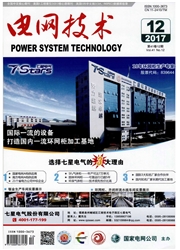

 中文摘要:
中文摘要:
针对基于电池租赁的换电模式下充换电网络的运营调度问题,首先建立了充换电网络中3种类型服务站的通用模型,用以表征服务站的行为与状态之间相互影响与制约的关系;然后对电动汽车用户的换电行为进行研究,建立换电服务的排队模型以计算服务站的实际服务能力,并据此对采用统计学方法获得的初始换电曲线进行修正;最后,基于分时电价建立充换电网络的运营调度模型,在满足用户换电池需求的前提下,通过联合优化电池组的充电方案、调配方案以及物流方案,使得充换电网络的日运营总费用最小。算例分析表明:物流车辆运费越低,集中型充电站对充换电站的满电池组支持作用体现得越明显,日运营总费用越小;此外电池配比率是影响充换电网络运营调度的关键因素,配比率越高,日运营总费用越小。
 英文摘要:
英文摘要:
In allusion to the operation and dispatching of electric vehicle (EV) charging/renewal network under battery leasing based battery renewal mode, firstly a general model for three types of service stations in charging/renewal network is established to characterize the mutual impacting and restricting relationship between the behaviors and states of service, stations; then the battery renewal behavior of EV users is researched to establish a queuing model to calculate actual service capability of service station, and on this basis the initial battery renewal curve obtained by statistical method is modified; finally, based on time-of-use pricing an operational and dispatching model for charging/renewal network is built, and under the premise of meeting the demand of battery renewal and by means of the charging scheme, allocation scheme and logistics project of jointly optimizing battery pack the daily total operational expenses is minimized. Case study results show that the lower the freight charge of the car for logistics, the more obvious the supporting role of the centralized charging station to the fully charged battery packs in charging/renewal station is, and the lower the daily total operational charge will be. Besides, the proportion of fully charged battery is a key factor impacting the operation and dispatching of charging/renewal station, the higher the proportion, the lower the daily total operational charge is.
 同期刊论文项目
同期刊论文项目
 同项目期刊论文
同项目期刊论文
 期刊信息
期刊信息
